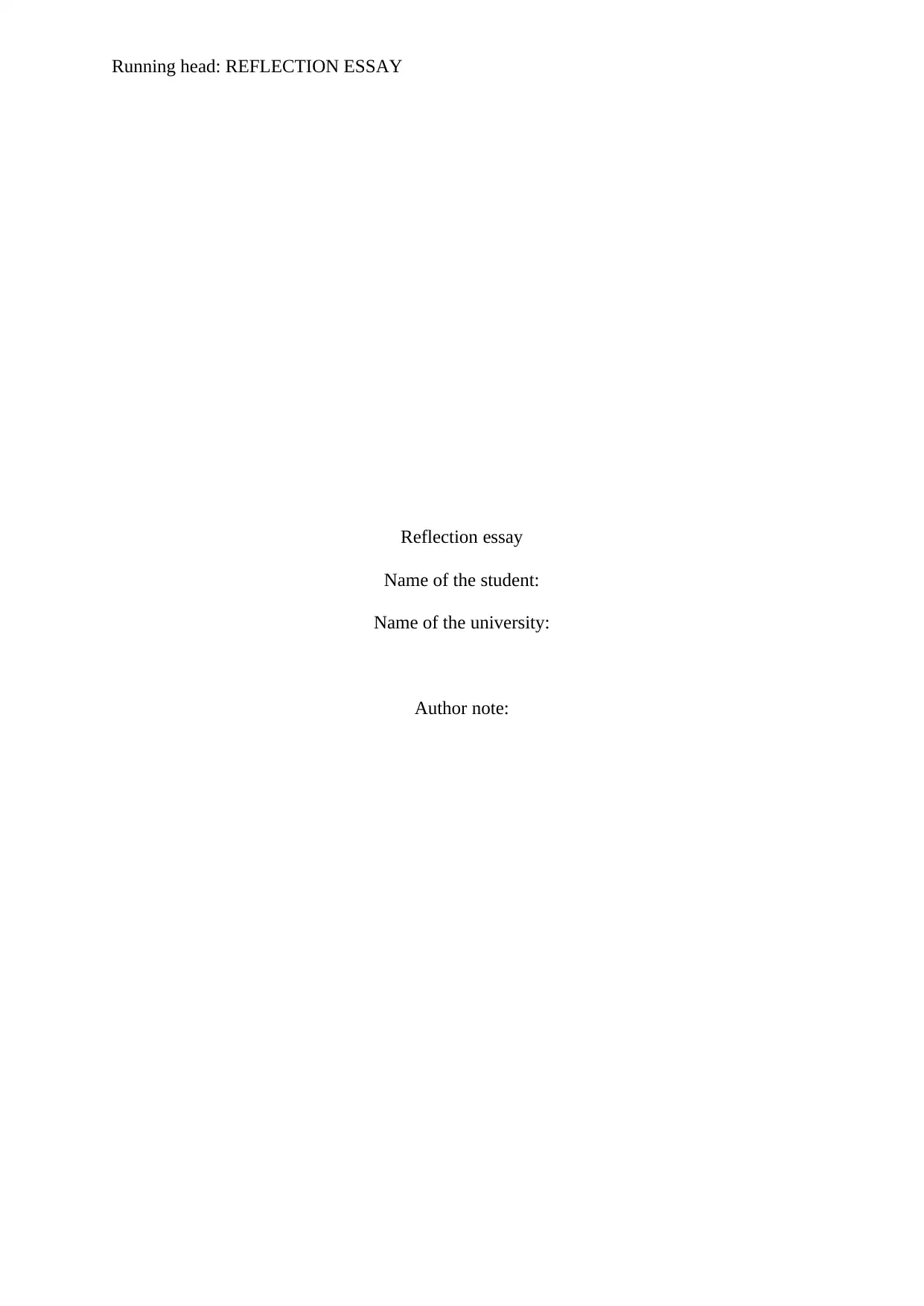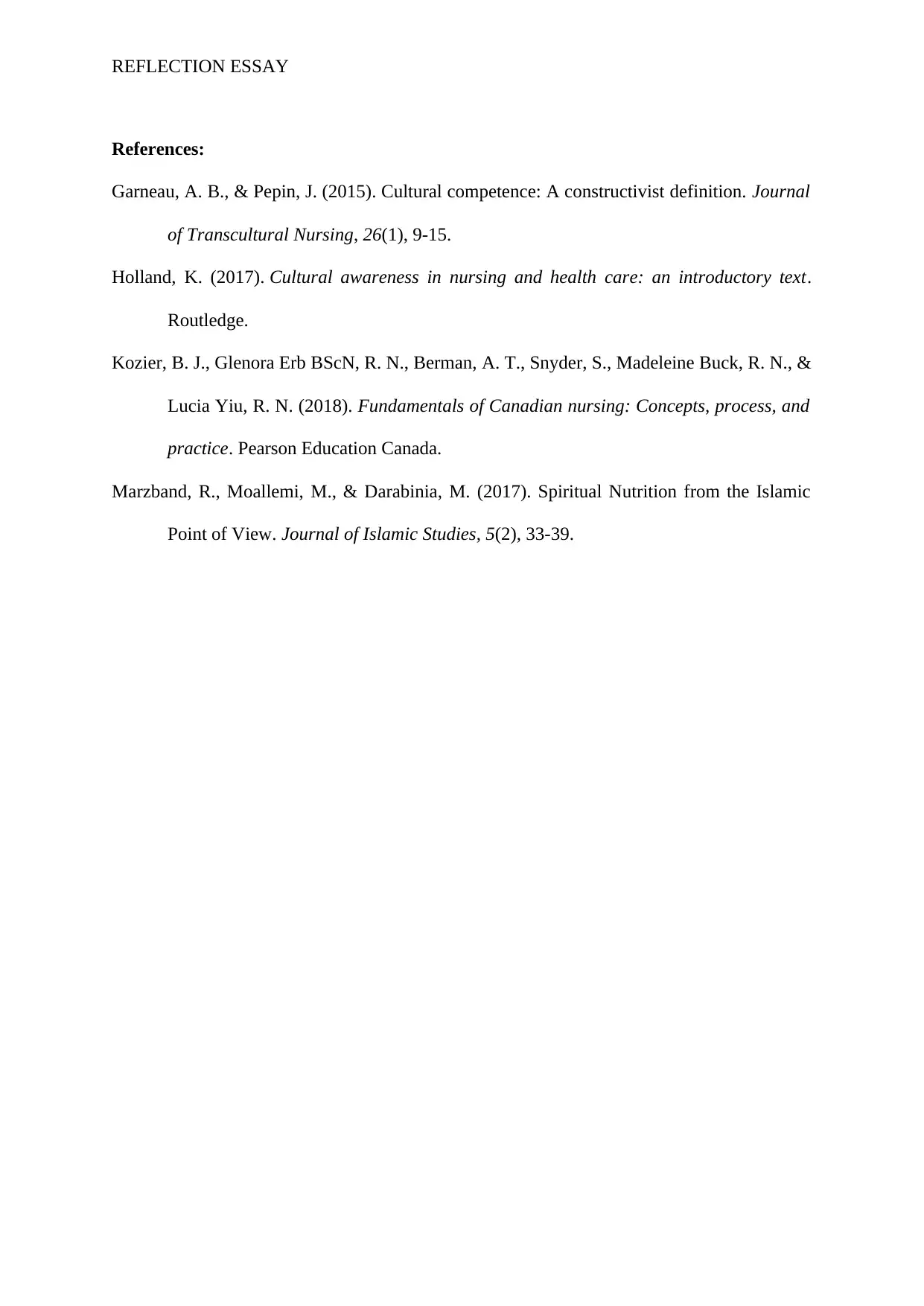Reflection Essay: Cultural Awareness and Sensitivity in Nursing Care
VerifiedAdded on 2023/04/20
|5
|931
|486
Essay
AI Summary
This reflection essay explores the critical role of cultural awareness, sensitivity, and appropriateness in nursing, particularly in the context of patient-centered care for diverse populations. The author, drawing from personal experience as a Muslim woman, emphasizes the necessity for nurses to understand and respect patients' cultural identities and norms. The essay highlights specific Islamic cultural practices, such as Roza (fasting) and dietary restrictions (e.g., avoiding pork and non-halal meat), and the importance of accommodating prayer times. The author concludes that nurses must be adequately informed about individual cultural norms to provide effective and culturally safe care, reinforcing the significance of cultural competence in nursing practice.

Running head: REFLECTION ESSAY
Reflection essay
Name of the student:
Name of the university:
Author note:
Reflection essay
Name of the student:
Name of the university:
Author note:
Paraphrase This Document
Need a fresh take? Get an instant paraphrase of this document with our AI Paraphraser

REFLECTION ESSAY
Introduction:
Patient centred care approach dominates the care service delivery environment in the
present day, and addressing the cultural identity and uniqueness of the patient is one of the
greatest requirements for successfully meeting the patient centred care principles (Garneau &
Pepin, 2015). This essay will explore the importance of cultural awareness, sensitivity and
appropriateness in the nurses providing care to the culturally diverse patient population.
Discussion:
Nurses have to provide a wide array of assistance and support to the patents, whether
while in hospice care or in the residential care environment. Considering the practice
standards of the nurses as well, addressing the cultural requirements and respecting the
cultural identity of the patients is one of the most important requirements for the nurses at all
circumstances. Similarly, many authors suggest that cultural awareness is vital for the nurses
and it is associated with a broader understanding of health and healing for the nurses
(Holland, 2017). Nurses are the first point of contact for the patients, without a clear
understanding of the cultural norms and practices, the care service delivery will be left
incomplete, especially for cultures like Islam. "Their facets relate to all aspects of life:
language, art, music, values systems (beliefs, morals, rules), spirituality and religion,
philosophy, family roles and organization, patterns of behaviour, childrearing practices,
rituals or ceremonies, recreation and leisure activities, festivals and holidays, nutrition, food
preferences, and health practices" (Kozier et al, 2018). This relates to the cultural norms and
practices for Muslims, and the significance of these norms in their spiritual wellbeing. In
Islamic culture, health is defined as enjoying different forms of desirable physical,
mental, social, and spiritual conditions, making it possible for a person to achieve a
satisfying life. Similarly, this culture identified nutrition to be strictly interlinked with
Introduction:
Patient centred care approach dominates the care service delivery environment in the
present day, and addressing the cultural identity and uniqueness of the patient is one of the
greatest requirements for successfully meeting the patient centred care principles (Garneau &
Pepin, 2015). This essay will explore the importance of cultural awareness, sensitivity and
appropriateness in the nurses providing care to the culturally diverse patient population.
Discussion:
Nurses have to provide a wide array of assistance and support to the patents, whether
while in hospice care or in the residential care environment. Considering the practice
standards of the nurses as well, addressing the cultural requirements and respecting the
cultural identity of the patients is one of the most important requirements for the nurses at all
circumstances. Similarly, many authors suggest that cultural awareness is vital for the nurses
and it is associated with a broader understanding of health and healing for the nurses
(Holland, 2017). Nurses are the first point of contact for the patients, without a clear
understanding of the cultural norms and practices, the care service delivery will be left
incomplete, especially for cultures like Islam. "Their facets relate to all aspects of life:
language, art, music, values systems (beliefs, morals, rules), spirituality and religion,
philosophy, family roles and organization, patterns of behaviour, childrearing practices,
rituals or ceremonies, recreation and leisure activities, festivals and holidays, nutrition, food
preferences, and health practices" (Kozier et al, 2018). This relates to the cultural norms and
practices for Muslims, and the significance of these norms in their spiritual wellbeing. In
Islamic culture, health is defined as enjoying different forms of desirable physical,
mental, social, and spiritual conditions, making it possible for a person to achieve a
satisfying life. Similarly, this culture identified nutrition to be strictly interlinked with

REFLECTION ESSAY
spirituality (Marzband, Moallemi & Darabinia, 2017).
As a Muslim woman myself, I am well acquainted with the cultural norms and
restrictions in our culture and how the nurses must know and understand these restriction or
norms if they are providing care to me. “Religious and spiritual beliefs are part of cultural
values and can influence dietary restrictions, family planning, the use of blood transfusions,
and death-related practices, such as autopsy, organ donation, cremation, and prolonging life”
(Kozier et al, 2018). Elaborating further, Roza is a significant part of my culture and in this
iconic Islamic cultural custom, we Muslims have to fast from before sunrise to after sunset.
Similarly, as another significant norm associated with my culture, Muslims cannot consume
pork or meat that is not halal. Hence, nurses caring for similar patient groups must know
these restrictions and their value while preparing diet chart for them or providing food to
them (Marzband, Moallemi & Darabinia, 2017).
Understanding the unique values and belief systems of particular religious groups is
important in providing culturally safe care" (Kozier et al, 2018). For the Islamic culture, the
day is divided into 5 specific time orientations, namely Fajr (dawn), Dhuhr (noon), ʿAṣr
(afternoon), Maghrib (evening), and ʿIshāʾ (night). For each segment, it is essential for us to
pray to start that period of day. As a nurse providing assisted living support, nurses must
know these cultural beliefs and arrange services for the patient so as to respect the culture of
the patients and provide them comfort and assurance in the facility (Garneau & Pepin, 2015).
Conclusion:
Hence, on a concluding note, the nurses must be adequately associated with the
specific or individual cultural norms while providing or planning care. Belonging to an ethnic
minority myself I understand the exact importance for nurses to have a thorough
understanding of ethnic cultures so as to not violate cultural safety in any manner. This paper
helped me re-evaluate the importance of cultural safety and understanding in order to provide
spirituality (Marzband, Moallemi & Darabinia, 2017).
As a Muslim woman myself, I am well acquainted with the cultural norms and
restrictions in our culture and how the nurses must know and understand these restriction or
norms if they are providing care to me. “Religious and spiritual beliefs are part of cultural
values and can influence dietary restrictions, family planning, the use of blood transfusions,
and death-related practices, such as autopsy, organ donation, cremation, and prolonging life”
(Kozier et al, 2018). Elaborating further, Roza is a significant part of my culture and in this
iconic Islamic cultural custom, we Muslims have to fast from before sunrise to after sunset.
Similarly, as another significant norm associated with my culture, Muslims cannot consume
pork or meat that is not halal. Hence, nurses caring for similar patient groups must know
these restrictions and their value while preparing diet chart for them or providing food to
them (Marzband, Moallemi & Darabinia, 2017).
Understanding the unique values and belief systems of particular religious groups is
important in providing culturally safe care" (Kozier et al, 2018). For the Islamic culture, the
day is divided into 5 specific time orientations, namely Fajr (dawn), Dhuhr (noon), ʿAṣr
(afternoon), Maghrib (evening), and ʿIshāʾ (night). For each segment, it is essential for us to
pray to start that period of day. As a nurse providing assisted living support, nurses must
know these cultural beliefs and arrange services for the patient so as to respect the culture of
the patients and provide them comfort and assurance in the facility (Garneau & Pepin, 2015).
Conclusion:
Hence, on a concluding note, the nurses must be adequately associated with the
specific or individual cultural norms while providing or planning care. Belonging to an ethnic
minority myself I understand the exact importance for nurses to have a thorough
understanding of ethnic cultures so as to not violate cultural safety in any manner. This paper
helped me re-evaluate the importance of cultural safety and understanding in order to provide
⊘ This is a preview!⊘
Do you want full access?
Subscribe today to unlock all pages.

Trusted by 1+ million students worldwide

REFLECTION ESSAY
adequate and effective care.
adequate and effective care.
Paraphrase This Document
Need a fresh take? Get an instant paraphrase of this document with our AI Paraphraser

REFLECTION ESSAY
References:
Garneau, A. B., & Pepin, J. (2015). Cultural competence: A constructivist definition. Journal
of Transcultural Nursing, 26(1), 9-15.
Holland, K. (2017). Cultural awareness in nursing and health care: an introductory text.
Routledge.
Kozier, B. J., Glenora Erb BScN, R. N., Berman, A. T., Snyder, S., Madeleine Buck, R. N., &
Lucia Yiu, R. N. (2018). Fundamentals of Canadian nursing: Concepts, process, and
practice. Pearson Education Canada.
Marzband, R., Moallemi, M., & Darabinia, M. (2017). Spiritual Nutrition from the Islamic
Point of View. Journal of Islamic Studies, 5(2), 33-39.
References:
Garneau, A. B., & Pepin, J. (2015). Cultural competence: A constructivist definition. Journal
of Transcultural Nursing, 26(1), 9-15.
Holland, K. (2017). Cultural awareness in nursing and health care: an introductory text.
Routledge.
Kozier, B. J., Glenora Erb BScN, R. N., Berman, A. T., Snyder, S., Madeleine Buck, R. N., &
Lucia Yiu, R. N. (2018). Fundamentals of Canadian nursing: Concepts, process, and
practice. Pearson Education Canada.
Marzband, R., Moallemi, M., & Darabinia, M. (2017). Spiritual Nutrition from the Islamic
Point of View. Journal of Islamic Studies, 5(2), 33-39.
1 out of 5
Related Documents
Your All-in-One AI-Powered Toolkit for Academic Success.
+13062052269
info@desklib.com
Available 24*7 on WhatsApp / Email
![[object Object]](/_next/static/media/star-bottom.7253800d.svg)
Unlock your academic potential
Copyright © 2020–2026 A2Z Services. All Rights Reserved. Developed and managed by ZUCOL.





